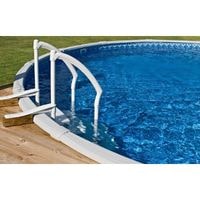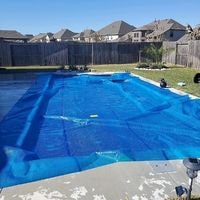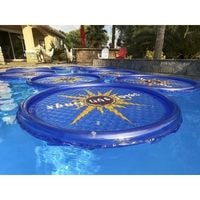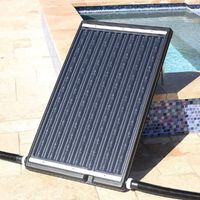How to heat an above ground pool. Heating your pool water can help you extend the swimming season by enabling you to enjoy it whenever you have time.
If you live in a region where winters are mild, this may even allow you to swim in the pool all year round.
You have three main options to keep the water warm: heating coils, liquid treatments, and solar covers.
Wind will make it harder for your water temperature to maintain a consistent level of warmth, so be sure to choose products like windshields.
How to heat an above ground pool

As a pool owner, you might already be familiar with the first option, an above-ground heating blanket.
These blankets are not expensive, and you can easily find them on the internet for around $60-$90.
However, there are also cheap DIY ways to heat your pool. For example, you can take old tires and cut up pieces of them to use in your pool.
Heat will escape from your pool when the outside is cold because it is harder for water to absorb heat immediately at lower temperatures.
You can heat your pool with a variety of options depending on how much money you want to spend.
Some people choose heating coils or solar covers, while others rely on bio warmth or air stones to achieve their goals. Make sure you think about what will work best for your individual situation.
Using Solar Blankets
Pools lose a lot of heat through evaporation, often as much as 75%, to be exact. This means that reducing the rate of evaporation can help keep your pool’s water warmer for longer.
The most common way to reduce evaporation and increase pool-water warmth is by using solar blankets, which are available in both floating and solid varieties.
Solar blankets can reduce evaporation by as much as 50%, don’t need to be installed (unlike rigid covers), and come with their own rolling mechanism.
Solid covers, on the other hand, guarantee total elimination of pool evaporation, but they aren’t always ideal since they’re heavy and may require a mechanical device to roll or unroll the blanket when covering the pool deck, depending on the type you choose.
Using Liquid Blankets

If you’re concerned about unsightly items being in your pool, opt for a liquid solar blanket. These can be purchased at pool supply stores and are nontoxic liquids that are added to the water.
They create an invisible chemical barrier to help minimize evaporation, slowing down the water loss, so it stays warmer for longer.
Such blankets aren’t as effective as other pool covers but are better for the environment and won’t distract people by retaining heat like blankets or rings may do.
They are also safe for pool equipment, unlike a guide or powerful motorized nets designed to catch leaves and bugs in your pool, which could cause damage if left unattended while they were on them.
You can use Solar Rings

One must be cautious of the myriad pool covers out there before making a choice. While using a solar blanket is often the cheapest and easiest option.
You may want something else if your setup requires an extra pair of hands or two pairs of hands.
Solar rings are large discs that float on top of the water, providing a barrier to heat loss in pools. Toss them into your pool. It’s that easy.
And for the best upshot, invest in rings with magnets. They separate themselves and stay in place, resilient to leaving gaps in coverage.
Heating your Pool with a Water Heater
A water heater is the most effective way to heat your pool. Vaporization provides rapid heat and can raise the temperature of your pool water by 30 degrees Fahrenheit or more, greatly extending your pool season.
Propane check valves keep hot water circulating in your swimming pool without having to run a hose. This heater works well in any area where natural gas service is available.
If you’re choosing between propane and open flame models, be aware that some insurance companies will not insure open flame units because they are considered significant safety hazards.
Heat Pumps are an Effective way
There are two different types of pool heaters to consider depending on how you prefer your pool to be heated.
Heaters use either electricity or gas, whereas heat pumps collect the warmth in the air around them and channel it over to the swimming pool.
Though heat pumps cost more than a regular heaters, they tend to use less energy and therefore cost less on an annual basis.
A drawback of a heat pump is that it only works best when temperatures stay above 60 degrees Fahrenheit as anything lower can harm the unit.
However, if you live somewhere pleasant throughout most of the year, then this type of alternative can help extend your swimming season but may not work well for heating an entire year long.
How to heat an above ground pool
Related Guides
